
Can you describe how you got into teaching?
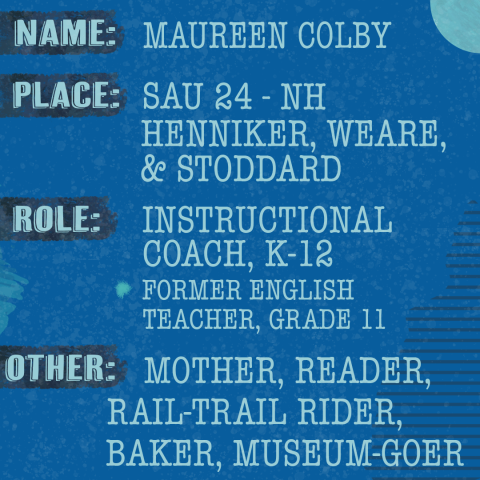
So my parents were educators. And I used to play school all the time as a kid. I just loved learning, even outside of school in all different kinds of contexts. I remember being grumpy because I have a fall birthday, so I had to wait a whole year to go to preschool and kindergarten. It felt like forever, and I was so excited when I could finally go.
Through adolescence, career paths changed a little bit. At one point, I thought I wanted to be a librarian. I still think that would be a fabulous and fun career choice. But then when I was in high school, I became pretty focused on becoming an attorney. I wasn’t sure if I wanted to be a defense attorney or a prosecutor, but I think I was curious about finding my voice and standing up for people. Those were things that I was very much drawn to.
But the pivotal moment when I decided that I didn’t want to pursue law was when the verdict for the O.J. Simpson trial came through. I was a sophomore in high school, and suddenly I realized that law isn’t like the classroom, the mock trial experience. There’s a lot more ambiguity. And I remember thinking: what if I had to defend somebody and I knew that they were guilty, or I was uncomfortable with what they had done? Or what if I had to prosecute somebody and recognized that there were mitigating circumstances? The verdict introduced a lot of conflict into my mind, and I didn't think that career choice was going to be compatible with my moral compass.
How did you decide on teaching English?
I loved English. And I had worked as a babysitter and summer camp counselor, and I knew that I liked kids. Then I thought—well, what if I combined them? How fun would it be to be a high school English teacher? It sounded so great.
I was definitely one of those kids who decided what I wanted to do first, which impacted where I looked for college. I ended up going to Saint Michael’s in Vermont as a declared English major. I knew I didn’t want to teach elementary school, and at the time I thought I would teach middle school. That was where my heart really was—teaching seventh and eighth grade—but to do so I had to take the secondary education licensure pathway.
Once I was on the teaching and English track, I had the chance to work at local schools. I ended up choosing high school teaching for my internship because I knew that my license was going to be for grades 5-12. I thought that there was no way that I would want to teach high school. Like that just wasn’t interesting to me. But I had a lot of middle school experience and felt like—I’m 21. Who knows what the job market is going to be? I might as well have some different experience. So I chose to teach grades 11 and 12 to try something new.
What was student teaching like?
I started teaching in the fall of 2001. I was 21 years old, and some of those kids—I mean, I was just four years older than them.
Wait—you started teaching in September 2001?!
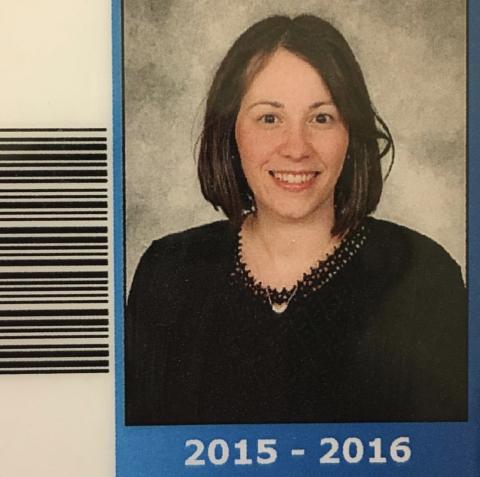
Yeah, that was just really interesting. I was living outside of Burlington in Colchester, Vermont on the Saint Michael’s campus. I student taught about 30 minutes away at Mount Mansfield Union High School in Jericho, and September 11 was my third week on the job.
It was the one time that I overslept my alarm. I was just slapping everything together to scurry out the door, and it was one of those mornings where I felt like a total scrub because I didn’t have a shower. I felt so frantic, but I made it to school in time and opened with a study hall. And that’s when somebody came to the door to let us know that something was going on.
My cooperating teacher’s son was a journalist living in Washington DC. And she immediately went to try to contact him but couldn’t get through. It was chaos. We turned on the radio, since we were in an era where people weren’t widely using the Internet in their classrooms. There was one anchored computer that you could use for e mail, but the radio was basically all we had. It was a constant feed throughout the day. I just remember it being so quiet and we were all trying to listen and get information in real time, but then also providing space for kids to process what was going on.
What was it like for you, a nascent adult trying to navigate this really big thing?
Around noon, the school finally got a live video feed in the auditorium and we were able to go and watch. It was the first time I'd actually seen any footage of what had happened. So all morning long I was trying to develop some sort of visual context—like what does this even look like?
I couldn’t believe it. This is going to sound so strange, but one of my initial thoughts was that I just wanted to go home. To New Hampshire. It was such a strange feeling. Because from the time I was 12, I was spending summers away from my family and didn't bat an eye. But nothing of this scale had ever happened in my life. So I can remember feeling like, what does all this even mean? How do we move forward? What’s going to happen now?
I also remember being worried because I graduated in ’98, and at that time the military was a great opportunity to see the world in relative peace. I had a bunch of friends who were really looking forward to getting posts in Europe on a peacetime non-conflict base, doing really important work. But I remember thinking—well, this shift things for a lot of people. For my friends. There was a base nearby to campus, essentially down the road. And I had never heard much before, but I can remember that all of a sudden the activity ramped up. It would be the middle of the night and I would hear jets going off, and it was hard not to think of my classmates and how this impacted them.
Did being a student teacher during 9/11 change how you teach?
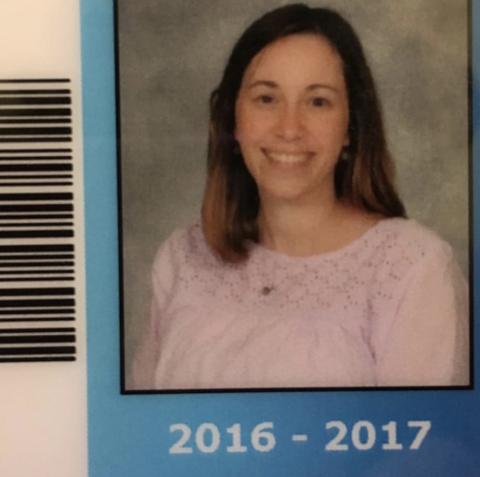
I think it helped me to recognize that you don't know when things like that are going to happen. In that case, I felt like it was a morning where I just couldn't get out my own way, even though I had all these plans and photocopies. I remember driving to school and being like, you're going to be fine, you have a plan, you're all set. And then someone knocks at the door and you have to change course immediately.
I think it's the recognition that in the moment, sometimes what you think is important just isn’t. It reminds me of when I was a kindergartener and The Challenger exploded. A lot of my peers recollect moment-for-moment when that happened—my husband can tell you exactly where he was. A lot of kids saw it happening in real time in their classrooms. So it some ways, it was a good reminder. A sobering lesson that we all have to be able to shift and respond.
Did you ever have a moment where you questioned if you wanted to be a teacher?
You know, I don't think I questioned it through college. I was really lucky because the placements I had really affirmed my comfort and excitement about working in schools. I was an academically driven kid, and I felt like I was really good at visualizing next steps. But I remember thinking to myself two or three years after I started, oh, I guess I didn’t really envision what it would be like to finish college and get a job and work in an educational space from 7am to 5pm for 20-40 years. So it took a few years, and then I began to feel a little bit like I was on a hamster wheel.
I was really enjoying what I was doing, and my assignments changed and my kids changed, people changed. But still there were moments where I felt like, I'm not sure about this. I didn't want to leave, but I had the same struggle that a lot of educators face, that question of: how do I grow? How do I push myself? How do I apply my skillset in a different way?
How did you answer that?
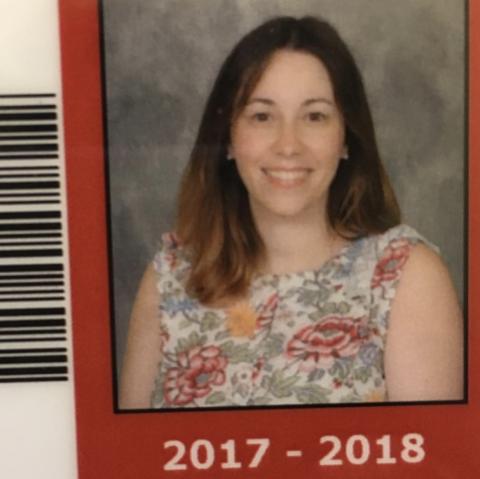
I ended up going back to school. I've often found that when I'm struggling with what to work on next, the answer for me is that I need to learn more. Go to school and learn and figure out how to apply it.
So I got a Master’s Degree in Literacy and Instruction, and that was really exciting because I felt like it was applicable. I felt like I could zero in on my craft, and even though you always have that opportunity to reflect and do better, sometimes the discipline of engaging in a program is really helpful.
I think a piece of it was also recognizing that in internships and student teaching, you're getting so much feedback all the time. That’s something that’s challenging about being an educator: there's so much feedback in the classroom. So much feedback. You have those students in front of you, and sometimes it’s really hard to parse through it all and figure out your next step. And I feel like when you’re new to the profession—the first one to five years—you’re figuring out so many things. You’re struggling between what you know is best practice and what you would like to do, and then also realistically understanding where you’re at and what you can actually do.
How did you learn to navigate that challenge?
Great question. I didn’t coin this phrase, but a colleague of mine and I talk about it a lot: the knowing-doing gap. It's that chasm between what you know you should be doing and what you're actually doing. And you just have to understand that you're going to fall in the gap because you can't do 100% of everything 100% of the time.
When there's a gap, I think some of it comes down to using that student feedback to figure out where you are. A big piece of it is prioritizing, figuring out what to do since you only have so much energy and you only have so much time. What is it that you really want to work on? What are you willing to spend your emotional and cognitive energy on? And does it have an impact? It’s hard because it's not always tangible.
So there’s student feedback that can help, but I also feel like you have to talk to other colleagues. It’s so important to recognize when you need to vent, that last block of the day or that class that’s just driving you bananas. So naming where you’re having a challenge and seeking out that person or those resources to help you navigate it is vital, and a gift that I had all along was the chance to forge relationships and find those people that I could go to when things were tough.
How did your relationship to time shift throughout your teaching career?
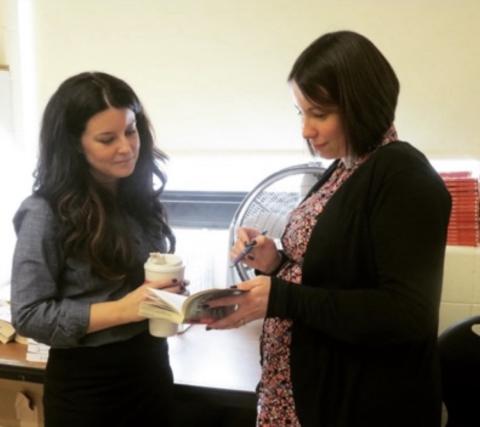
That's a fantastic question. Initially I was one of the first people here in the morning, one of the last people to leave. When I think about those early days of teaching, I just wanted to be present in the physical space so I could get prepared and do what I needed to do.
When I started, there were a lot of new teachers in my school. We used to have Saturday detention, and often a lot of the new teachers would come in on Saturday with the kids. We weren't supervising the detention, but we would go to our respective classrooms and grade or prep. You would work and then check in with each other, like how's it going? What are you working on? And then sometimes we would go get lunch. It was very social in a really good way.
Then over time, I had more of a desire for physical distance from the building. A lot of that was aligned with getting married, having my own home—you just develop different priorities. So again it’s the question of: you only have so much time and energy, what do you want to prioritize?
It was also a matter of developing confidence. Early on, I recognized that a lot of that time I spent preparing was anxiety. I was nervous, and my toxic trait coping mechanism is over-prepping. So a lot of it was also developing that confidence. Yes, I do believe that it’s important to re-read chapter three of the Great Gatsby so that I’m ready to go for this student-led discussion. But I don't need to read it three times.
It's a balance. You don’t want to become the filing cabinet teacher who shows up and does the same old, same old. Because that classroom responsiveness is so important, but it’s also a lot of work. You have to know yourself and recognize where your strengths are.
Things started to shift for me again when I became a parent. Obviously, that’s also a huge, natural shifting of priorities. And that first year was challenging because I still wanted to be at school early and stay late and be able to get things done. But then I also had a tiny human being that I was trying to raise and it’s so important to give them that energy. Not in a bad way—I wanted to. But I had to work really hard at recognizing that there are different seasons.
I had to respond differently and recognize, “I’m not doing anything wrong if I'm not at my desk at 7:15. This is a different season, and the shift is okay.” Because the drop off scenario is nothing short of a Herculean effort, and I didn’t want to stress myself out by putting on additional pressure. Then I realized, okay, childcare is open until five. I'm going to work really hard to manage my time in that space after school, pick him up, and then when I go home I can feel like I'm walking at the door with everything ready to go and be really present.
Do you think that actually made you a worse teacher, shifting priorities?
I feel like becoming a parent made me a much better educator. I want to be really clear that I don't think you have to have that experience to be a good educator. It’s really not necessary, and everyone’s experience is different. But for me, because I was working with high school students and very much seeing them as growing, evolving people, I then had the chance to recognize the same needs of this tiny human being. I wanted him to have access to opportunities and be in inclusive and welcoming spaces, and I really started to recognize the weight of what teachers do. The value of that contribution. And I would think to myself, “I want my son to have teachers who are going to show up for him, and so I owe it to these students to show up for them, too.”
So for me, becoming a parent was really helpful. It made me much more empathetic to the challenges that parents face. And I saw that parents and families come in all sizes, shapes, and forms and have a myriad of experiences, and I became more mindful of this diversity during my interactions. Even when there were conflicts, I recognized that all parents want to know that somebody is caring about their kid and doing the best that they can for them. So that was helpful and sometimes hard.
What’s it like having a husband who’s also an educator?
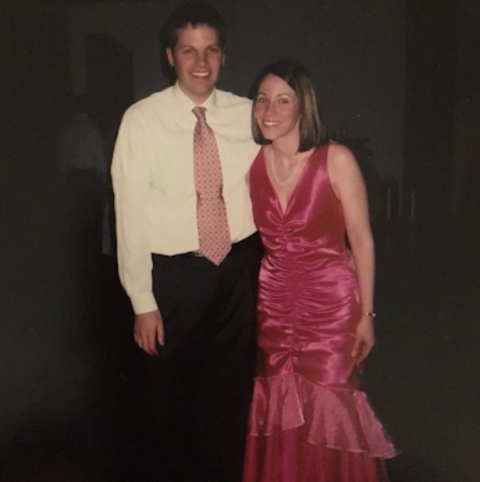
I think we both feel very passionately about our jobs and the importance of modeling public service for our son. The challenge can be a little bit of that balance. I have never wanted my husband to feel like I'm saying yes to other peoples’ kids over him. And I feel like we've done a pretty good job, but sometimes it can be a tough balance.
You're both really steeped in the weedy work of being educators. Sometimes you have differences of opinions, and there are times when you recognize that students or your building colleagues’ needs may come first. So you have that empathy, and the benefit is there are short texts. You totally understand all the teacher acronyms, you understand all of the minutia and passion. It can still be hard when something happens that takes priority, but overall the benefits outweigh the challenges. For many educators it's hard to separate yourself from the work, so I think you have to be really good at encouraging your partner to separate themselves when that makes sense.
Let’s throw a little love to language arts. What did you love about teaching English?
For me, I find story so important. We can learn so much by thinking through a narrative lens, and books have such power to shape and change lives. I find that very inspiring. And when I think about a wider, broader ELA context, communication in general is also so important.
Honestly, when I chose English as my content area, part of my learning curve early on was recognizing that it was not going to be a classroom full of lit majors. I am so thankful that I had so many students who helped challenge that notion. Because then I realized that the real challenge in front of me, which I feel is wildly exciting, is helping students understand how those skills are transferable.
The texts that we use or the tasks that we ask students to do, it's not about those texts or the task. It's about the skill, right? It's about what we want them to do with that learning. I just think that's so important. And that was part of the draw for me.
I also had English teachers in my past who were incredibly inspiring and helped me to recognize that I could have a voice. They just shaped me so much. And to see myself in stories or written pieces—I love that. I don't know who says it, but there’s a concept in literature that draws an analogy to windows and mirrors. We're all looking for a mirror, but having windows into spaces that are not where we're from is also so vital.
What’s a book that you keep coming back to?
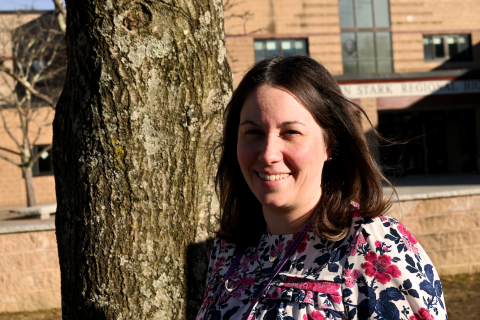
I feel like this is a quintessential English teacher answer, but for me The Great Gatsby has been a really seminal text. I hated it when I was in high school. Really despised it. My teacher who used the text in class is now one of my dearest colleagues and somebody that I really, really admire, and I remember feeling a little guilty at the time because it was rare that I would read a book and hate it. And I think some of it was maturity, and some of it was that none of the characters are likeable.
Then I read it for the second time in college, and at that point I was four years older and had more experience in the world and was like—oh, Fitzgerald is kind of nailing the human condition. We see lots of Tom Buchanans or glimpses of Nick and Daisy in all of these different places. So I think that drew me in, and a lot of what the text is encouraging us to ask is, “can we repeat the past?” That question is so transferable. A lot of people struggle with those feelings of nostalgia, and I just love the way Fitzgerald writes and explores it. So that's a book I keep coming back to.
Can you talk about your transition to instructional coaching?
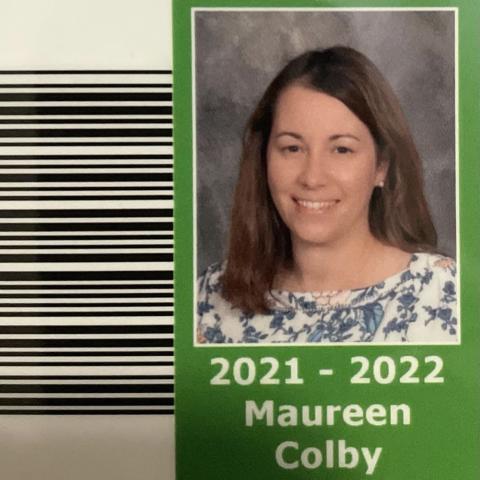
So that has been an interesting transition in the best way. When I took this position as an instructional coach, I had been in the classroom for 20 years. I had done some leadership work as a department head for four years previously, but prior to taking on this role, I was a self-described creature of habit. So it was a little bit of a risk for me because I felt like the classroom was a place where I felt really comfortable. It’s a big deal for me when I'm like, I want to do something different. But I was ready for a change and a challenge.
I talked about the idea of impact earlier, and that’s something that’s really important to me. And I think what attracted me to this job was being able to spread influence or impact in a different way. And not in terms of me being the sole person doing it, but empowering teachers. That's something that's really important to me: having teachers recognize the impact they have and feel empowered. And some of that feeling came from the fact that I had so many mentors over the course of my career that helped me to feel capable and confident and focused on students, and I wanted to give back.
I think the other thing that I love is that I get to see so much. I love working in K-12. I love the opportunity to be inspired by what's happening with our youngest and oldest learners, and I'm incredibly excited to see how those transferable skills develop. I was in a fourth-grade classroom this morning and they were engaging in a Socratic seminar, which is so cool. And then in the same day, I could see that happening with tenth graders. It’s so amazing to think about that skill progression, to look at those fourth graders and think about what their Socratic seminars are going to look like by the time they're tenth graders. It’s just really cool.
What do you miss about being in the classroom?
Some of what I miss is that relationship building, since that’s super important to the work that I do. And the relationships that you develop with students when you teach eleventh grade every day for 75 minutes are pretty incredible. When you think about hopping on a journey with a learner and you're seeing them every single day—I don’t want to call it a loss, but moving out of the classroom is a loss and you have to be okay with that. It’s not part of my experience anymore.
I also feel that even when I get a little nostalgic, I remember that it’s not about me and it's never been about me. I will still get those feelings of missing those relationships, and that’s okay, but it’s really about those students. And I think about a first-grade friend who stopped by the office that I was working out of today just to wave, and there’s a part of me that’s like, how beautiful is it to be able to have snapshots of some of these learners over the course of their careers? That is special.
What’s it like to have stayed in the same district for so long?
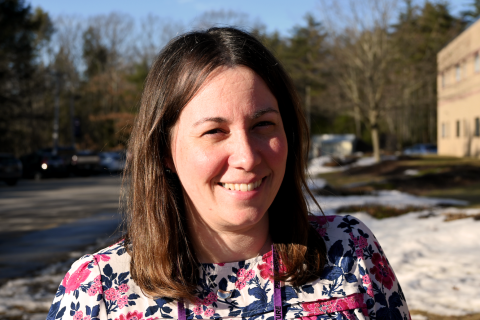
This may sound really cheesy, but because I've worked at SAU 24 my entire career, now I'm in a space where former students of mine are parents. They're living in the community, and I honestly mean it, though it sounds a little silly, that one of the most beautiful parts of my job is seeing the children of former students in classrooms that I'm working in. It’s nothing short of magical.
I can't tell you how many times I'll be in a space and think, this face looks so familiar. I'm thinking about this former student of mine, and she's got three kiddos. One of her kids looked up at me the other day, and I realized that he has the same eyes as his mom. It happens all the time. I was in a seventh-grade classroom and looked around and thought, oh, I taught your mom and your dad and your mom. They were also peers in high school and now they're growing as parents together. I love that. I feel like sometimes as educators, you don't get to see the amazing, powerful work that your learners do once they graduate. That has just been really cool to witness.
You teach in a rural district. How do you think tech access has changed?
We’re really lucky to be one-to-one here, which sometimes amazes me. Because ten years ago, we had 48 Chromebooks in a room and kids were only able to use them in class. So I feel like being one-to-one is huge in terms of kids being able to access technology, and even having more of our kids on Internet at home has been a relatively recent, important leap.
Education technology right now, in this current world, where are we at?
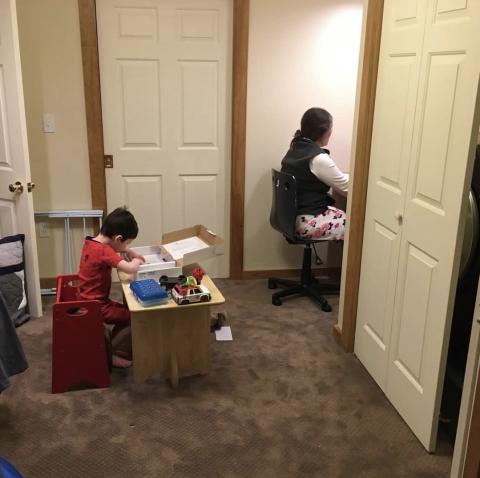
AI keeps popping up, and I feel like especially in a high school context it's a question of: what do we do? I think we're really on the brink of—I don't want to say being outpaced—but really having to think a little bit differently.
It comes back to how we transfer what we’re asking students to do here. Is it really relevant? Is it really rigorous, transferable? Is it something that's going to serve these students in the future? We are now teaching in a space with digital natives. Kids are coming into school with a certain amount of comfort with technology, and we’ve improved access to technology, which is huge in terms of building equity. Now the challenge is thinking about how to use technology thoughtfully.
Working as educators, we need to figure out how we can use and teach technology to help kids create new things and build new skills. It doesn't mean that people aren't doing that—people are. But I think that's just a challenge. How do we do it more universally?
You have three months and can be anywhere in the world—what do you want to learn?
My husband and have been talking a lot about going to Europe, so I love the idea of picking a city and going all in. Paris has been on our list. I just feel like it would be so fun to have a little flat and go to the Louvre every day and learn about art history. I just think that would be fascinating.
If you weren't in education, what would you do?
So I definitely think I would be a librarian. Or I feel like being a baker would be so cool. I love that idea, making sweets and cookies and cakes. And I think about how as educators, we are creators. We love to create things, and I love creating with food. There's something so fun about that.
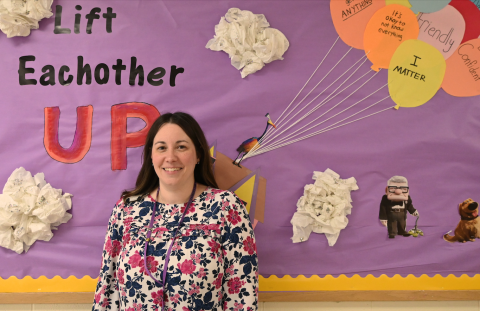
If you had a student who came to you and said, “I want to be a teacher,” what would you say?
My go-to answer would be: tell me more about that. What interests you about teaching? What are you thinking? I feel like that's a question that I use a lot when I'm working with teachers. It can be so easy in the role that I'm in to feel like I’m the advice giver, and even teachers may think that’s my job. But really I think it's about helping people figure out their own path. So I would say, “tell me more. What's your reasoning?”
When I reflect on why I came to teaching, it was because I loved English and I loved reading and I was so excited about the content area. I’m still passionate about it. But over time, I became more excited about growing people. I think that disposition is so important, and so knowing why you want to be a teacher is critical. It’s not from a judgmental space, but more in terms of setting yourself up for meeting your own needs and expectations and being there for those learners.

